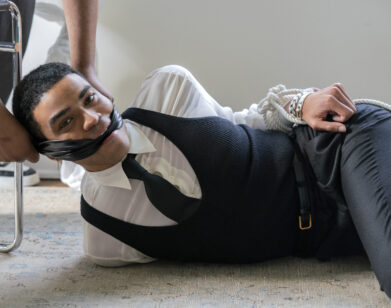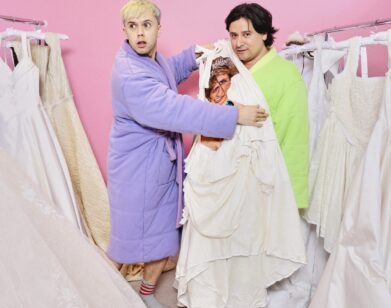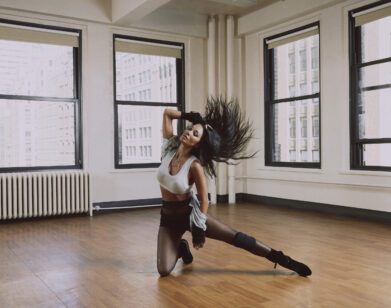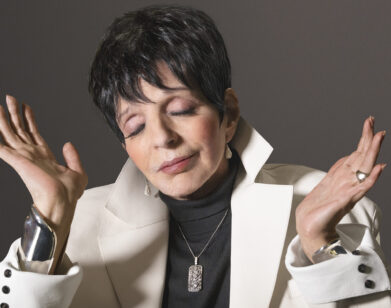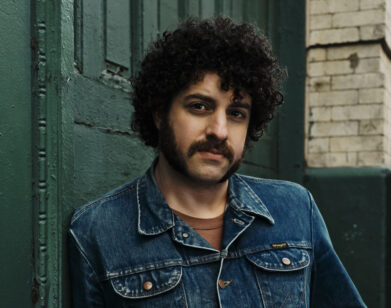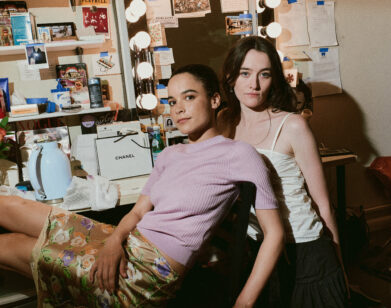ICON(S)
Audra McDonald and Leslie Odom Jr. Have a Reunion for the Ages
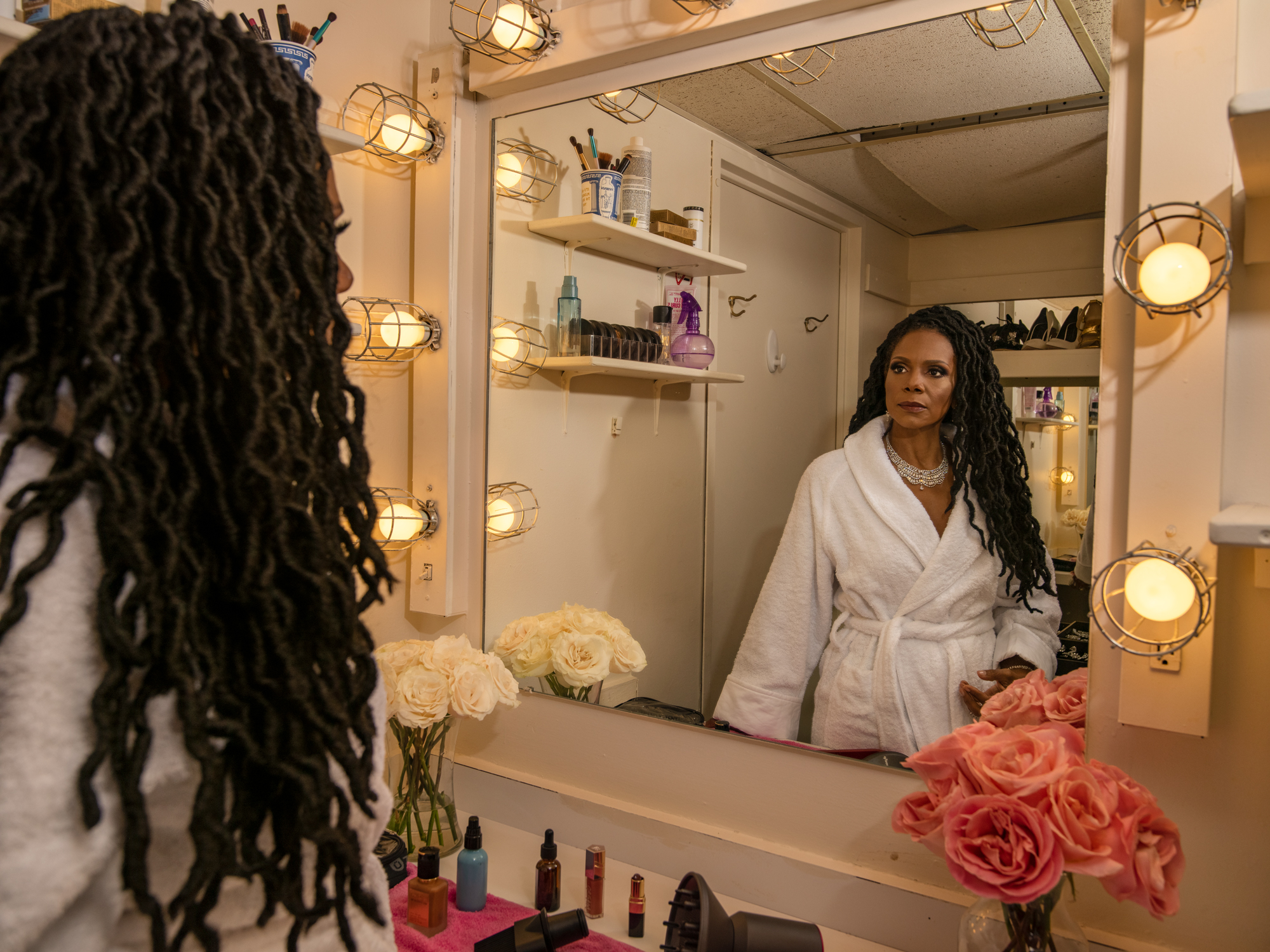
Audra McDonald backstage at the August Wilson Theatre on West 52nd Street. Robe by Frette. Earrings, Necklace, and Bracelet by Pluie De Cartier High Jewelry.
In our September issue, we assembled a portfolio of five legendary Grand Dames of Broadway who define elegance, drama, humor, and grace, and who our guest-editor Jeremy O. Harris called “the foundation of New York’s theatrical heartbeat.” In the second of five, the actor and singer Audra McDonald speaks to the fellow Tony Award winner Leslie Odom Jr. about Broadway, championing for diversity behind the scenes, and how the past year has ushered in a new era.
BROADWAY DEBUT: The Secret Garden, 1996
SIGNATURE ROLES: Carrie Pipperidge in Carousel, Marie Christine in Marie Christine
TONY AWARDS: 6
YOUTUBE IT: “Maybe This Time”
INTERVIEWED BY: Tony Award-winning actor Leslie Odom Jr.
———
LESLIE ODOM JR: Hi. Can you hear me?
AUDRA MCDONALD: Hi! I can.
ODOM: I’m so happy that we found a way to do this. How’s Will? How’s Sally? How’s everybody?
MCDONALD: Everybody’s really good. Will’s in Atlanta. We’re heading to Portugal at the end of August, once he gets finished with his work down there. How’s Nicolette? How are the babies?
ODOM: They’re good. Everybody’s here with me. I’m in Greece, and they all got here yesterday.
MCDONALD: Do you remember where we met? Was it Dreamgirls?
ODOM: I can’t believe you remember that. But tell the truth, do you really remember me from that room? I remember you.
MCDONALD: That whole time, I felt like my body was floating above it all. But I think that’s how we all felt. We were going to do this thing, then 9/11 happened, and then it became, “We must do this. We must find a way back to New York.” So everything about it has a filmy cloud over it. What do you remember?
ODOM: It’s less fuzzy for me. I was still at Carnegie. I read about the Dreamgirls concert happening, and I sent my friend Michael McElroy an email saying, “Anything you can do, I have to be in the ensemble. I have to be in the chorus of this momentous thing.” And to my surprise, Michael put me in touch with Seth [Rudetsky, the artistic producer for the show], and they put me in the ensemble. The rehearsals were in August. And then I went back to school and was supposed to come back for the concert, which was September 12 or 13. I did all the rehearsals, and I didn’t get to do the concert. I had no money. Seth still laughs at this, because the real truth, if you can believe this, is Seth said we had to wear a tuxedo. I was still a college student. I didn’t have the money to rent a tuxedo. So I couldn’t do the concert.
MCDONALD: Oh my god.
ODOM: I have memories of those rehearsal rooms. I really doubt that I introduced myself to you, but I remember being in the room with you and Heather [Headley, who played the role of Lorrell Robinson]. The first time I saw you onstage was so momentous because I listened to the cast albums, and I saw you on awards shows. But Porgy and Bess was the first show that I saw you in.
MCDONALD: Oh wow.
ODOM: It was a real mark on the timeline, and I’ve seen you in everything you’ve done since. I don’t miss an Audra McDonald performance now, but that was the first time that I was in New York, and I had the money to buy a ticket. I can say so much about that performance. I remember you reaching out for Porgy’s hand, in that shaft of light. You were like a wounded bird reaching out for somebody that was going to save you. There are so many moments from that performance that stick out to me.
MCDONALD: I went to opening night of Hamilton at The Public, and about midway through “The Room Where It Happens,” I was like, “Holy crap, this show’s going to be amazing. He’s going to be a motherfucking star.” And the thing that was the most amazing to me was, sometimes when you see people, you’re like, “That’s an incredible raw talent. I can’t wait to see that talent grow and progress.” But you were so settled. You knew who you were already, and I don’t even mean as Aaron Burr. I mean as Leslie Odom Jr. There was such competence and calmness, a focus about the work you were doing.
ODOM: I appreciate you saying that, but I think I was afforded something you weren’t, in that I got to work my stuff out in the dark for so many years. Nobody was paying attention for so long, so I was in the woodshed. I was still growing, still trying to figure out how to work more, and how to find my way into better rooms. When I got presented with a masterpiece, which is what Lin gave me, I felt like I knew what to do with it, which is damn near nothing. You and I both know, you have to do so little. I trusted the material more than anything. But you came out of Juilliard, and went right into a masterpiece. You were thrust into the center of the world with Master Class.
MCDONALD: All I ever wanted was to be in a Broadway show. When I heard Dreamgirls was on Broadway, I was still a teenager in Fresno. I was like, “Well, shoot. What am I going to be able to be in? Because this won’t be on Broadway by the time I get there.” I was like, “That’s it. That’s the only one they’re letting us into. What am I going to do?” So everything that ended up happening with my career early on was so far beyond what I had dreamed. It took off, and I just tried to hold on.
ODOM: It’s such a hard thing to tell people, because you don’t want the advice to be, “I got lucky, you should too.” You don’t want that to be the advice, but man, you really want to be prepared when that opportunity comes.
MCDONALD: When you start out in this business, it’s like, “Career, career, career, career.” In some ways you feel very fertile, as far as what’s going on with your career. Even if you’re not super successful, you’re fertile with your creativity. And it’s so interesting how that energy is churning towards my children now. But at the same time, what legacy do we leave them? How do we leave the world a better place for them? So there’s that aspect of it as well. And certainly, what do we do to pick projects that are right? Right for us, right for our families. I’m thinking about the projects I’ve been doing lately. It’s like, “Okay, how is this Black person being portrayed in this project? What’s the diversity like behind the scenes? What message does it promote?” In some ways it feels less selfish. Whereas before it was just like, “I want that job. I want that role. For me.”
ODOM: I’m feeling you completely. Can you share with me a little bit about what this past year has been like? Have you ever stopped for this long?
MCDONALD: March 13 was the big shutdown day. I did one very socially distanced concert in Aspen, and then I started filming The Bite in October. It was the longest that I’d paused in a while. I’m lucky to be able to say that. And honestly, besides the fear and panic we were all feeling, I was so worried about my friends and our colleagues in this business, starting to see them pack up and leave town because they couldn’t afford to stay. My other panic was, I was worried the world would go back to normal and I wouldn’t have enjoyed the forced pause and being with my family. That I would have wasted that time. Did you feel that?
ODOM: Yes. At the beginning, we were talking very seriously about the expansion of our family. “Should we be reproductive during this time?” And then Ahmaud Arbery, that particular murder, affected me so profoundly, and just thinking about bringing these Black babies here. They pulled that young man over on the side of the road and demanded proof of his legitimacy and his manhood. And he answered them there. He said, “You won’t take my liberty for 30 seconds. I’m going to die here.” He did what he did, and that’s a martyr. So I’m just like, “Jesus, how do I bring a son into this world?” Nicolette and I talked through it a lot, and I was talking to friends, and processing stuff, too. Renée Elise Goldsberry, our dear friend who has two beautiful children, said, “Leslie, if Black people had been waiting for the threat to be neutralized, we wouldn’t be here.” If our parents had waited, if our grandparents had waited for America to be a safe place for us, we wouldn’t be here. We have our kids, and we do our best to teach them the right way, to keep them safe, and to make sure they know who they are, where they live.
MCDONALD: It was such an odd time to be sitting at home, hiding from the virus. But for me, it was enjoying the time with the family, and then at the same time seeing the world blow up with the racial reckoning, and hopefully the beginning of a new era, in terms of how we move forward as a country. Perhaps we couldn’t have gotten so many different industries in the world to focus if we hadn’t been in the pause because of the pandemic. I hope though, as we come back—it’s got to change. There’s a reckoning, and I think it has to look different when we come back. It has to.
ODOM: I think it will. Theater people are some of the most empathetic, good-natured, loving people that you can meet in this business, and because we had the time, we had to deal with the monsters under our own bed. I don’t think it’s going to be easy. It’s going to take a second for people to have different hiring practices, and a different way we speak in these rooms, but I think we’re going to rise to the occasion. What do you think?
MCDONALD: I think so. Not to quote a song from your show, but history has its eyes on you. There are too many people watching, there’s too much at stake. There will be accountability, because there are too many of us that will speak up. It just can’t be the way it was. It can’t.
ODOM: That’s right. We have to activate it, and we have to use our voices in the moment, to make sure to keep pressure on, and to keep things moving forward. Call me a cockeyed optimist, but, I’m hopeful.
MCDONALD: Yes, we have to be. We have to be.
———
Hair: Chioma Valcourt
Makeup: Tiffany Garlick at Dame Cosmo Inc.
Photography Assistant: Lance Charles
Fashion Assistant: Mabel Nugent
Special Thanks: Circle in the Square Theatre and Circle in the Square Theatre School

